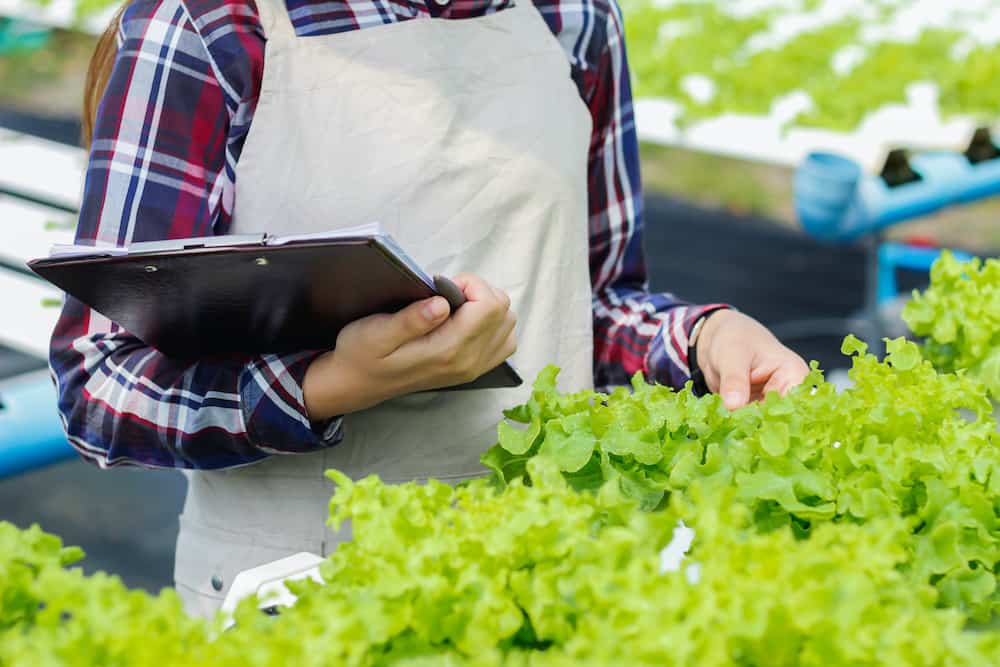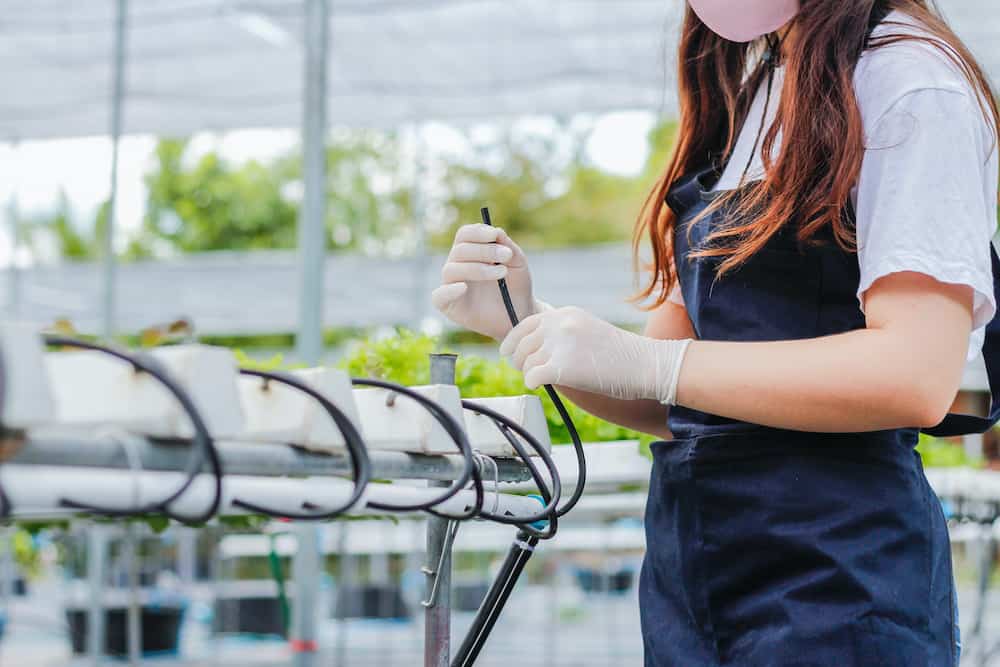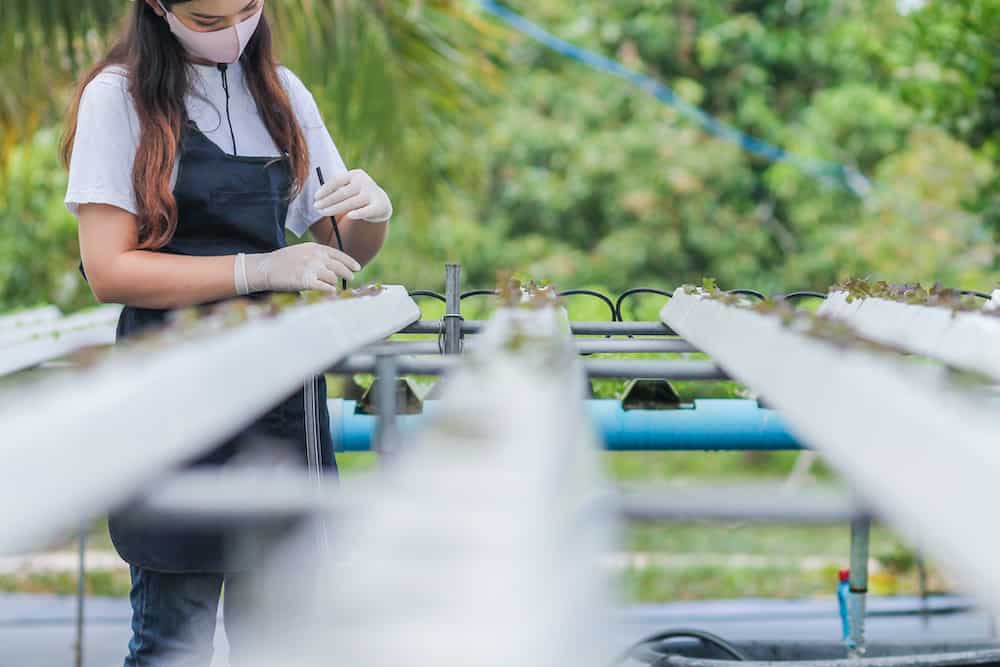When growing plants hydroponically, creating a solution with the best hydroponic nutrients is a must.
Hobby farmers at home typically use liquid hydroponic nutrients. These are ideal for beginners. These are premixed liquid fertilizers which are quick and easy to use. You simply add water. You can also choose organic hydroponic nutrients.
However, in commercial use with bigger operations, hydroponic powder nutrients are common. This involves mixing calcium nitrate with the main nutrient mix.
When deciding on the best hydroponic fertilizer, it comes down to convenience and cost.
There are many options to choose from to help your plants grow their best. You can buy it or make your own DIY solution.
You can purchase a pre-made option that is concentrated. This will allow you to just add water to dilute the ingredients.
Alternatively, you can make your own hydroponic nutrient solution. It will be important to have the correct ratios of NPK and other minerals. You’ll want to ensure you have the right nutrients to help your plants.
Here we explain the hydroponic nutrients and what they do for plants.
Whether you choose hydroponic powder nutrients or liquid nutrients, using these fertilizers will help your plants thrive and provide their maximum yield.
What Nutrients Do I Need for Hydroponics?
When considering hydroponic nutrients solutions for your plants, you want to have the correct minerals and elements. These will give your plants the food they need to grow.
The right nutrients will also ensure that there are no problems with your plant’s growth. In turn, your plants will grow bigger and faster.
Plants require 16 elements to grow. These can come from fertilizers, air, and water. When growing with hydroponics, some of these will need to come from minerals in the nutrient growth solution.
When beginning hydroponics, you may want to purchase pre-made mixes in order to ensure the proper concentrations of each nutrient throughout the crop’s life cycle. Too much or too little of any nutrient can affect the plant’s growth.
Whether you want to purchase a pre-made solution or make your own, ensure that majority of these nutrients are present.
You’ll also want to consider which aggregate, or growing medium, you are using.
The best hydroponic nutrients are NPK. This stands for nitrogen, phosphorus, and potassium. Oftentimes, in commercial hydroponics operations, many use fertilizers with just these main minerals.
Nutrients Hydroponic Plants Need
Here are the hydroponic nutrients to feed your plants:
1. Nitrogen
Nitrogen (N) is a major ingredient in your hydroponics solution that will help fend off nitrogen deficiency. This issue is fairly common in soil-planted fruits and vegetables.
Nitrogen is important for a plant’s overall health, and particularly for growth. It is also a big part of the roots.
When it comes to this ingredient, remember that it is needed in different amounts for every plant, so having the correct nutrient levels is key.
2. Potassium
Plants growing hydroponically will also need potassium (K).
Potassium is essential to the plant’s ability to take in carbon dioxide. This is needed for photosynthesis.
Soil usually gives plants the potassium they need, but this ingredient needs to be added to a hydroponics solution to allow the plant to use it.
The way to do this is by introducing potassium through the fertilizer. The best hydroponic fertilizer will come with potassium, so you can just add how much you need.
3. Phosphorus
Plants need phosphorus (P) to help them in the process of performing photosynthesis. This is also a nutrient that helps the roots. Potassium is also called potash.
Plants that are grown hydroponically need strong roots to grow properly. This allows them to absorb the nutrients given to them.
What’s more, phosphorus is not only crucial for growing roots, it is also necessary for energy transfer.
If you see NPK on a hydroponics fertilizer solution, the P stands for Phosphorus.
4. Calcium
In hydroponics, calcium (Ca) is an essential part of creating and maintaining a plant’s cell wall. It is used for growing new tissue in a plant.
Calcium allows sugar and nitrogen to travel throughout the plant and helps the roots grow. However, it does not move around itself since it is not transportable.
If your plant has a calcium deficiency, you will see a noticeable stunted growth of the leaves and shoots. You might also see the leaves curling up.
Just as humans need calcium for our bones, plants need calcium to help maintain their structures.
5. Magnesium
Along with calcium and sulfur, magnesium is considered one of the secondary plant nutrients. These three are considered secondary because plants need them in less quantities than they do NPK.
Most functions in plants need a large amount of magnesium to occur. Magnesium (Mg) is responsible for the plants being green in color. It is also needed in photosynthesis.
With deficiencies in magnesium, plants cannot grow. It is a nutrient that can sometimes be overlooked but gravely needed. Without magnesium, the plant would not be green, could not eat, and would not be able to perform photosynthesis.

- Use the best hydroponic nutrients to get the maximum yield.
6. Sulfur
Plants need chlorophyll, and without sulfur, they wouldn’t be able to produce it. Sulfur (S) is required for the production of a plant’s chlorophyll and is needed for producing plant proteins.
If your plant begins to have a yellow hue in the new growth, then it could be low on sulfur.
This deficiency will look similar to a deficiency in nitrogen. However, the new leaves on the top of the plant will be yellowing. This will differ from the bottom, older leaves when the plant is nitrogen deficient.
7. Iron
Iron (Fe) is an ingredient that doesn’t need to be added in large amounts. A little goes a long way with this nutrient.
With an iron deficiency, plants won’t have the color they normally do. It is also used in the creation of chlorophyll, like sulfur.
On top of that, iron is also involved in several of the enzyme functions. If iron is not present, many plant functions won’t happen.
8. Manganese
Photosynthesis is the most essential function of the plant’s growth, and manganese (Mn) plays a major role in this process.
It helps the absorption process so that the plant has the energy to begin photosynthesis. It also assists in the respiration system of a plant.
Without manganese, a plant will begin to experience necrosis. This condition will worsen when the pH levels are higher than normal.
9. Copper
This is an ingredient that is not an essential nutrient by definition but is needed for the purpose of beginning photosynthesis. It is needed for producing chlorophyll in the plant.
Another primary function of copper (Cu) is that it is used as a fungicide. This is important as it prevents fungi from growing and wreaking havoc on the plant.
If your plants don’t have enough copper, they will begin to wilt. They will also eventually turn brown, and the leaves will curl.
10. Zinc
Zinc (Zn) is a nutrient that is important because of the work that it does with other nutrients. It works with iron, magnesium, and manganese to produce enzymes, chlorophyll, and proteins.
Because this nutrient is used in the production of so many things, it is needed in multiple plant growth phases.
A zinc deficiency in plants is often difficult to notice. However, it could cause a lot of problems if left untreated. If you see the veins of new leaves getting darker, this is a sign of zinc deficiency.
11. Molybdenum
Plants also need “micronutrients” such as molybdenum and boron.
Molybdenum (Mo) is a nutrient plants need in order to convert nitrogen into ammonia. It’s also an essential function in a plant’s cycles of nitrogen, oxygen, sulfur, and potassium.
As it plays a role in major functions, it is undeniably an important nutrient.
Without molybdenum in the hydroponics solution, plants will experience yellowing of the veins and/or pale leaves. The leaves may also start to curl into itself, which is known as cupping.
12. Boron
When it comes to plant growth, boron (B) is an essential part of the process. Also a micro-nutrient, boron aids in the growth and overall health of the plant as it grows in size.
Boron also plays a role in the health of the roots. When your plants are deficient, you will see a reduction in their size.
When examined, you will also find that the roots have swollen and have changed in color. This is an obvious sign of deficiency and can lead to other issues down the line.
13. Chlorine
Though hydroponics has a lessened risk of having plants die due to disease, they can still die. It’s important the feeding solution doesn’t have parasites other harmful microbes.
With chlorine (Cl) in your hydroponic solution, you will not have to worry so much. It acts as a purifier that kills bacteria.
Without chlorine, any bacteria that isn’t helpful to the plant could take over. As a result, it could cause the plant to stop growing and eventually die.
What Are You Growing
Before adding extra nutrients, research what you are growing. Ask at your local garden center or nursery. The experts there will educate you on what nutrients your plants require when growing in hydroponics. In general:
Need in higher quantities: The best hydroponic nutrient solution will include mostly Nitrogen, Phosphorus, and Potassium (NPK).
Secondary plant nutrients required in lesser quantities: These are essential nutrients you will need in less amounts than NPK. These are: Calcium, Sulfur and Magnesium.
Micro-nutrients you will need in less amounts: Some micro-nutrients to feed your plants in a hydroponic garden are Molybdenum and Boron. These will likely also be included in the hydroponic nutrient solution you buy.
Can You Make Your Own Hydroponic Nutrients?
Yes, you can make your own hydroponic nutrients solution. However, when you are beginning with hydroponics, it’s easier to buy pre-made versions. As you become more experienced, you can make your own hydroponic fertilizer.
Once you decide which of the best plants for hydroponics to grow, you can learn about the ratio of each nutrient to maximize yields for those plants.
In time, you will know a general hydroponics feeding schedule to be sure each plant is getting the best hydroponic nutrients.
Buying each of these ingredients in order to make a hydroponics fertilizer solution might sound like a lot. This might make you wonder whether it’s possible to make the nutrients yourself.
Although you cannot actually create your own nutrients, you can create the solution out of those nutrients.
Mixing a blend of the minerals and micro-nutrient ingredients will allow you to make your own hydroponics solution. Whether you use organic hydroponic nutrients or hydroponic powder nutrients, the choice is up to you.
As long as you stick to using the best hydroponic fertilizer with your solution, you will see a huge difference in your plants.
Again, when making your solution, you want to ensure that it is balanced. If not, the pH level could be off, which will affect your plants greatly. This is why it’s important to decide what you want to grow before you choose the exact nutrients.
You’ll want to be sure to test the pH level regularly.
Can You Grow Hydroponics Without Nutrients?
In addition to water, you need to add nutrients when growing with hydroponics. You cannot grow plants without using the nutrients plants need. The most essential nutrients are NPK which are Nitrogen, Phosphorus, and Potassium. Other secondary essential ingredients are Calcium, Magnesium, and Sulfur.
In traditional gardening, plants establish roots in soil. The soil provides nutrients to foster plant growth. The more enriched the soil, the more hearty the plants grow. In hydroponics, you need to provide the nutrients.
Whether you use organic hydroponic nutrients or non-organic nutrients, you will need to add nutrients to your hydroponic garden.
For the plants to grow, you need to supply them with those necessary nutrients as well as water. If not, they will not grow or even survive. It’s important to choose crops that grow well and avoid what cannot be grown hydroponically.
Hydroponic Nutrients: Powder or Liquid
There are pros and cons to using dry nutrients in the form of powder and wet ingredients in the form of liquids. Both powders and liquids will be effective for your hydroponic garden.
The advantages to using nutrients in liquid form is they come already in the correct ratios; you will only have to add water. One of the main issues with the liquid forms of nutrients is that they don’t always keep well.
An advantage to using powder nutrients is they keep well and will last a long time.
However, a disadvantage to using hydroponic powder nutrients is you have to be sure you don’t inhale them while measuring and mixing them.

- You will need to choose between hydroponic powder nutrients or liquid nutrients.
Do You Need Fertilizer for Hydroponics?
In hydroponics, fertilizer is the same as hydroponic nutrients. These are the minerals plants need to grow in water. Plants need fertilizer in the form of nutrients. You can buy them in liquid or powder form.
With a hydroponics garden, your plants grow in a combination of water and hydroponic fertilizer filled with nutrients in order to grow. Unlike with traditional soil gardens, plants won’t have soil in order to get nutrients.
In addition to the hydroponics equipment, the nutrients for hydroponics are the most important part of gardening using this method. Without the soil bringing the nutrients to the plants, you have to provide it for them.
You need to invest in the best hydroponic fertilizer if you want your plants to grow well. In fact, this is just as important for helping your plants to grow.
The best hydroponic fertilizers come with nutrients that the plants need. This will allow the plant to reach maximum growth.
With that in mind, you don’t want to skimp out on the fertilizer. Doing so will compromise the time you put into making your own solution.
Maximizing Plants’ Growth
Overall, there is a lot to think about when building DIY hydroponics systems.
In addition to deciding between the types of hydroponics and what growing medium you will use, you will need to select the crops you want to grow. After that, you must research the correct ratio of nutrients for those crops. Hydroponic nutrient solutions will enrich your plants.
Ensuring the correct ratio of nutrients is why many beginners start with pre-made solutions when starting a hydroponic garden. As they hone their skills, they can decide to make their own solutions which is often more cost effective.
In addition, having some experience with using organic fertilizer for traditional gardening can make it much easier to understand the importance of nutrients in hydroponics.
With hydroponics vs soil, you’ll find with the right nutrients, you’ll find your plants grow faster, better, and give you the ability to harvest more than once.
No matter what you decide to do—purchase a powder or liquid solution or make your own—the nutrients are important.
You want to know what to look for when you are searching for a solution to use for your plants. Make sure it has the correct fortification, including macro and micro-nutrients.
Be sure to purchase the best fertilizer in the right balance for what you want to grow. Quality matters at all stages of growth, including root growth to the development of fruit and more. If your budget permits, you may want to consider buying organic hydroponic nutrients.
See related:

